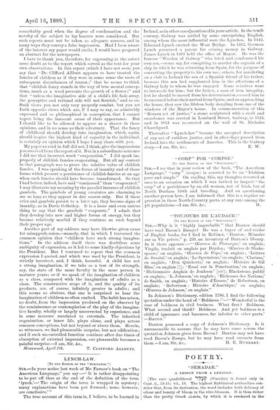LYNOH-LAW.
[To THE EDITOR OF THE " SPECTATOR."] your notice last week of Mr. Farmer's book on " The American Language," you say :—" It is rather disappointing to'be put off thus at the end of the definition of the term lynch,'—` The origin of the term is wrapped in mystery ; many explanations have been put forward ; none, however, are conclusive.' "
The true account of this term is, I believe, to be learned in Ireland, as in other cases:mentioned in your article. In the tenth century, Galway was settled by some enterprising English, among whom the most influential were the Lynches. In 1442, Edmund Lynch erected the West Bridge. In 1462, Gorman Lynch possessed a patent for coining money in Galway. James Lynch in 1493 held the office of Mayor. He was the famous " Warden of Galway " who tried and condemned his own son,—some say, for conspiring to murder the captain of a ship in which he was returning from Spain, for the purpose of converting the property to his own use ; others, for murdering on a visit to Ireland the son of a Spanish friend of his father, because this son had supplanted him in the affections of a Galway lady to whom he was engaged. Some relatives went to intercede for him ; but the father, a man of iron integrity, lest he should be moved from his determination, caused him to be executed before their arrival from Spain; and on approaching the house, they saw the lifeless body dangling from one of the windows of the Mayor's house. In commemoration of this " Roman act of justice," a stone sculptured with a skull and crossbones was erected in Lombard Street, Galway, in 1524, and in 1854 was re-erected on the wall of St. Nicholas Churchyard.
Thereafter " Lynch-law " became the accepted description of any act of ruthless justice, and in after-days passed from Ireland into the settlements of America. This is the Galway


































 Previous page
Previous page